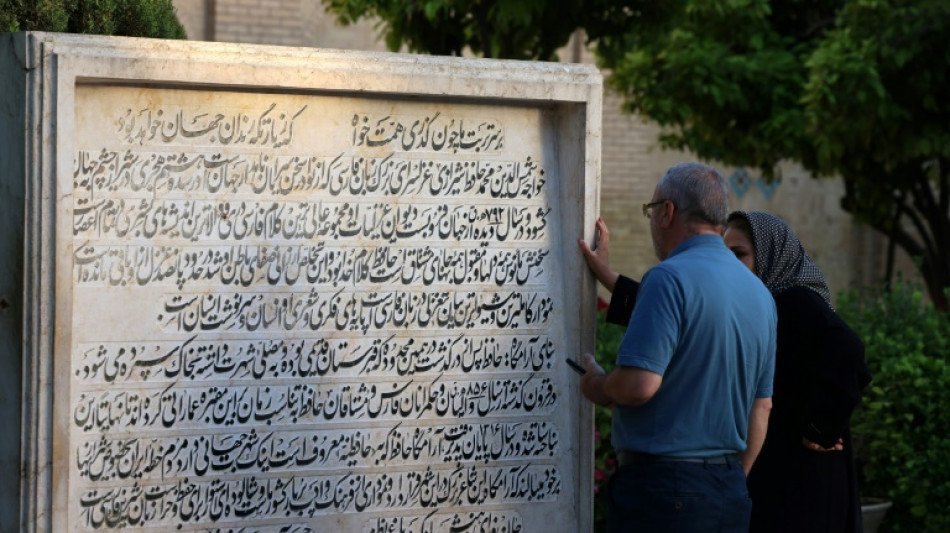
-
 Lillard will try to match record with third NBA 3-Point title
Lillard will try to match record with third NBA 3-Point title
-
Vonn breaks leg as crashes out in brutal end to Olympic dream

-
 Malinin enters the fray as Japan lead USA in Olympics team skating
Malinin enters the fray as Japan lead USA in Olympics team skating
-
Thailand's Anutin readies for coalition talks after election win

-
 Fans arrive for Patriots-Seahawks Super Bowl as politics swirl
Fans arrive for Patriots-Seahawks Super Bowl as politics swirl
-
'Send Help' repeats as N.America box office champ

-
 Japan close gap on USA in Winter Olympics team skating event
Japan close gap on USA in Winter Olympics team skating event
-
Liverpool improvement not reflected in results, says Slot

-
 Japan PM Takaichi basks in election triumph
Japan PM Takaichi basks in election triumph
-
Machado's close ally released in Venezuela

-
 Dimarco helps Inter to eight-point lead in Serie A
Dimarco helps Inter to eight-point lead in Serie A
-
Man City 'needed' to beat Liverpool to keep title race alive: Silva

-
 Czech snowboarder Maderova lands shock Olympic parallel giant slalom win
Czech snowboarder Maderova lands shock Olympic parallel giant slalom win
-
Man City fight back to end Anfield hoodoo and reel in Arsenal

-
 Diaz treble helps Bayern crush Hoffenheim and go six clear
Diaz treble helps Bayern crush Hoffenheim and go six clear
-
US astronaut to take her 3-year-old's cuddly rabbit into space

-
 Israeli president to honour Bondi Beach attack victims on Australia visit
Israeli president to honour Bondi Beach attack victims on Australia visit
-
Apologetic Turkish center Sengun replaces Shai as NBA All-Star

-
 Romania, Argentina leaders invited to Trump 'Board of Peace' meeting
Romania, Argentina leaders invited to Trump 'Board of Peace' meeting
-
Kamindu heroics steer Sri Lanka past Ireland in T20 World Cup

-
 Age just a number for veteran Olympic snowboard champion Karl
Age just a number for veteran Olympic snowboard champion Karl
-
England's Feyi-Waboso out of Scotland Six Nations clash

-
 Thailand's pilot PM lands runaway election win
Thailand's pilot PM lands runaway election win
-
Sarr strikes as Palace end winless run at Brighton

-
 Olympic star Ledecka says athletes ignored in debate over future of snowboard event
Olympic star Ledecka says athletes ignored in debate over future of snowboard event
-
French police arrest six over crypto-linked magistrate kidnapping

-
 Auger-Aliassime retains Montpellier Open crown
Auger-Aliassime retains Montpellier Open crown
-
Lindsey Vonn, skiing's iron lady whose Olympic dream ended in tears

-
 Conservative Thai PM claims election victory
Conservative Thai PM claims election victory
-
Kamindu fireworks rescue Sri Lanka to 163-6 against Ireland

-
 UK PM's top aide quits in scandal over Mandelson links to Epstein
UK PM's top aide quits in scandal over Mandelson links to Epstein
-
Reed continues Gulf romp with victory in Qatar

-
 Conservative Thai PM heading for election victory: projections
Conservative Thai PM heading for election victory: projections
-
Vonn crashes out of Winter Olympics in brutal end to medal dream

-
 Heartache for Olympic downhill champion Johnson after Vonn's crash
Heartache for Olympic downhill champion Johnson after Vonn's crash
-
Takaichi on course for landslide win in Japan election

-
 Wales coach Tandy will avoid 'knee-jerk' reaction to crushing England loss
Wales coach Tandy will avoid 'knee-jerk' reaction to crushing England loss
-
Sanae Takaichi, Japan's triumphant first woman PM

-
 England avoid seismic shock by beating Nepal in last-ball thriller
England avoid seismic shock by beating Nepal in last-ball thriller
-
Karl defends Olympic men's parallel giant slalom crown

-
 Colour and caution as banned kite-flying festival returns to Pakistan
Colour and caution as banned kite-flying festival returns to Pakistan
-
England cling on to beat Nepal in last-ball thriller

-
 UK foreign office to review pay-off to Epstein-linked US envoy
UK foreign office to review pay-off to Epstein-linked US envoy
-
England's Arundell eager to learn from Springbok star Kolbe

-
 Czech snowboard great Ledecka fails in bid for third straight Olympic gold
Czech snowboard great Ledecka fails in bid for third straight Olympic gold
-
Expectation, then stunned silence as Vonn crashes out of Olympics

-
 Storm-battered Portugal votes in presidential election run-off
Storm-battered Portugal votes in presidential election run-off
-
Breezy Johnson wins Olympic downhill gold, Vonn crashes out

-
 Vonn's Olympic dream cut short by downhill crash
Vonn's Olympic dream cut short by downhill crash
-
French police arrest five over crypto-linked magistrate kidnapping


Iranians seek guidance from ancient poetry of Hafez
When Iranians worry about life's big questions, many seek answers in the works and wisdoms of Persia's most revered poet, Hafez -- sometimes with the help of a parakeet.
Retired housewife Mitra, 61, had questions about whether her son married the right woman, so she went to the tomb of Iran's beloved 14th-century bard in the southern city of Shiraz.
Seeking guidance, she visited a fortune-teller there, one of many who offer advice with the help of Hafez's collected works, a book of odes known as the Divan.
After sharing her concern, Mitra watched anxiously as the fortune-teller thumbed through the thick tome, opened it on a random page and pointed his finger at one verse.
He read it out and then explained its metaphors and mystical insights. Mitra's face lit up -- the message was positive, and domestic harmony lay ahead.
"I finally did the consultation today for my son, because I had doubts on whether his marriage was a good decision," she said in the garden of the Hafez mausoleum.
After the nod of approval for her daughter-in-law from within Iran's ancient lyrical treasure trove, she said: "I finally regained hope".
Some Iranian fortune-tellers, known as falgir, offer a special service to truly randomise the selection of the all-important Hafez verse.
Chirpy parakeets known as "love birds" hop across stacks of colourful envelopes that contain his enigmatic poems and pick one out with their tiny beaks.
- Rich poetic tradition -
As Hafez devotees thronged into the mausoleum to pay their respects, another person seeking advice was Hamidah, a 44-year-old chemistry professor.
"I always ask Hafez for help and consult him," she said. "I can't explain this with the laws of physics, but it's a reality for me."
Poetry enjoys immense popularity in Iran, where timeless verses on love and spirituality can be found woven into carpets, engraved in jewelry and emblazoned on street billboards.
The nation prides itself on its masters such as Rumi, Saadi, Khayyam and Ferdowsi, who wrote the epic Book of Kings, preserving Iran's pre-Islamic heritage through mythical tales and legends.
"They are our national figures and the creators of our culture," said Farshad, a 41-year-old doctor.
Early 20th-century poetry gave voice to social protest and faced censorship under the former monarchy, including the works of dissident poets Ahmad Shamlou, Forough Farrokhzad and Simin Behbahani.
But no Iranian poet has enjoyed enduring and universal adoration like Hafez, and a well-worn copy of his Divan compendium is found in most households.
People from all walks of life regularly cite his lyrical wisdoms, mostly on the themes of love and wine and ironic takes on the hypocrisy of holy men.
His poetry is recited during Nowruz, the New Year, and other celebrations such as the winter solstice festival.
"We start the year with the poems of Hafez," said Maryam Youssefi, a 46-year-old housewife, for advice on what it "has in store for us".
Fortune-tellers, known as falgir, who interpret Hafez, can be found across Iran, but especially at his tomb, set amid rose gardens in Shiraz, 800 kilometres (500 miles) south of Tehran.
The tradition of Hafez bibliomancy -- using his ancient wisdoms for divination and guidance -- is known as Fal-e Hafez.
- 'Ambiguous and multifaceted' -
Hafez lived during a turbulent era of Persia's history, and his contemplative verses often spoke of pain and human suffering as well as religious hypocrisy.
His influences can be found far beyond Iran in the works of Johann Wolfgang von Goethe and Ralph Waldo Emerson, among others.
Hafez has remained a venerated figure after the 1979 Islamic revolution, even if some senior clerics have voiced disapproval of the Fal-e Hafez tradition.
In recent years, one criticised it as out of line with Islamic sharia law and urged people against "following Hafez's divinations".
Nonetheless, devotees keep flocking to Shiraz, and Hafez poetry reading sessions still draw large crowds, while the divination custom remains alive and well.
Many Iranians swear by it while others "practice the tradition without really believing in it," said Ahmad Akbarpour, a writer and poet from Shiraz.
Mostafa Eskandari, a 67-year-old fortune-teller, says he learned Hafez's poetry by heart and has been interpreting it for over 30 years.
"Hafez's poems are ambiguous and multifaceted. They can be interpreted in different ways," he said.
Yet the master of old speaks to everyone individually, said Eskandari.
"If a thousand people each set an intention and open the book of odes together, each will receive a different response."
H.Jarrar--SF-PST



